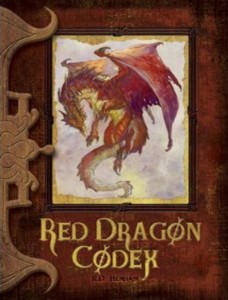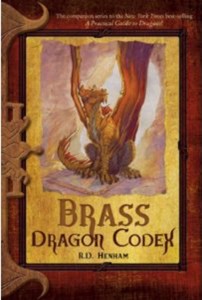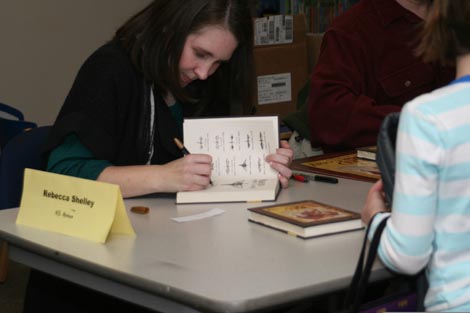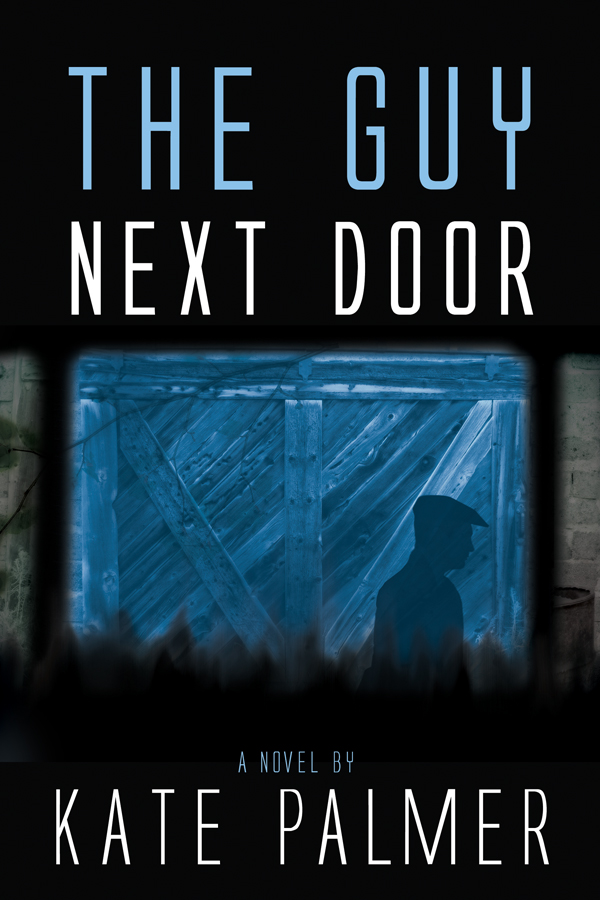Rebecca Shelley graciously accepted an invitation to visit our five local elementary schools and do a book signing at our local library. I’m so glad she did; I truly enjoyed getting to know her and her husband. Rebecca is the author of Red Dragon Codex and Brass Dragon Codex. The many dragon fans in our little community were so happy to meet an author and creator of dragons. If you have a child who loves dragons, these books are a must read. Each book is a stand alone story, however, the characters from Red Dragon Codex make a cameo appearance at the end of Brass Dragon Codex so you may want to read Red Dragon Codex first.
The Dragon Codex books are a companion series to A Practical Guide to Dragons. Each book is written by a different author. The publisher wanted the books to be shelved together in bookstores and libraries so the author listed on the all the Dragon Codex books is R.D. Henham. In the forward to each book, R.D. Henham describes how he is assisted by many scribes in the telling of these dragon stories. I asked Rebecca to visit my blog for an interview so you could get to know this busy homeschooling-writer-student-mom (aka assistant scribe to R.D. Henham) as well.
Kate: Your pathway to publication was a little different than submitting a finished manuscript. Tell us about it.
Rebecca: I submitted, as a writing sample, a book that I had written to Mirrorstone Books. The editor liked my writing and asked me to write a pitch for a book for the Dragon Codex line. I pitched her the idea for Red Dragon Codex. She liked it and asked me to write an outline. I wrote an outline and sample chapter from which she decided to give me a contract to write the book. I really enjoyed this process. It sparked my imagination, and I had fun writing the book.
 Kate: How do you develop your plots and characters? Do you use any set formula?
Kate: How do you develop your plots and characters? Do you use any set formula?
Rebecca: This is a terrific question. I don’t think I’ve ever written two books exactly the same way. Sometimes I start with a character, sometimes with a plot idea, sometimes with just an emotion. I think the one constant is a trick I learned in a writing class (unfortunately I’ve been to so many that I can’t remember exactly which one or who the wonderful teacher who taught me this was to thank properly. I’ll just have to give a great big THANKS to all the many teachers and mentors who helped me learn to write.)
When I start a new book, I picture myself sitting down with my back against a tree trunk. On the other side of the tree sits a storyteller. I say to the storyteller “Here’s the idea I have. Now it’s your turn. Go ahead and tell me a story about it.” Then I sit and listen to the storyteller. When she talks, I type.
I think what this process does is allows me to get beyond my critical voice and conscious mind into my creative self. I think writers need to find some way to get in touch with the creative side. This is my way. It takes trust, and it takes patience. Sometimes I have to write pages of my own thoughts about my own life and problems before I can even sit down to the tree and listen to the storyteller talk. I have to get all of reality cleared out of my head, because it is so loud and noisy I can’t hear the storyteller without silencing my own worries first.
I guess that might sound strange to just sit down and write what an imaginary storyteller says. What about planning? What about outlines? What if, heaven forbid, the story teller gets it wrong? Well . . . I’ve written over twenty books. The storyteller hasn’t let me down yet. When I have to do an outline like with the Dragon Codex books, I’ve found that the process works the same. I tell the storyteller what I need and that I need it in an outline form, and the storyteller delivers. I find my subconscious or creative mind much smarter than my conscious one.
Kate: That is such a unique and relaxing technique. What fascinates you about dragons? Why do you think other people are fascinated by dragons?
Rebecca: Dragons are the supreme symbol of power and might, cunning and wisdom, magic and make believe, and flight and freedom. Dragons touch on what is very best in mankind and what is darkest. I think there is something in each of us that cries out to be given voice, an inner dragon of sorts that connects with this universal symbol. Dragons appear in the earliest stories of mankind and continue through the ages and across cultures. Why? It’s a question I ask myself over and over and never tire of exploring.
Kate: I had never thought about all that dragons symbolize–I think you’ve got something there. You’re a homeschooling Mom which is something I consider every year or two but have never done. I’m always interested in what leads parents to make this decision. So … how or why did you decide to homeschool?
Rebecca: My children begged me to home school them. I agreed to it, because I love learning. Nothing thrills me quite like finding out about the world around me: history, science, math, social studies, geography. It’s all fascinating, and the more I learn the more I have to write about.
A tried-and-true statement fed to every beginning writer is to, “Write what you know.” I used to hate that statement. I felt I had nothing of interest to write about in my own peaceful, picture-perfect life. Oh sure, I’ve had my problems but nothing as interesting as fighting dragons, going on quests, or flying with fairies. Why in the world would I want to write about my own very boring life?
Then it occurred to me–if what I know is boring, then maybe I need to KNOW something else. Since then I’ve delved into current events, history, modern and ancient cultures and gained a ferocious appetite for learning about and experiencing the world around me. Education is everything.
Kate: As a homeschooling Mom, how do you find time to write?
 Rebecca: I reserve one week out of every three months where the kids get off school and I don’t do anything but write. I’ve never been really good at writing at little bit every day. It takes me too long to get immersed in a story, to coax the storyteller to start talking and then to transform myself into the characters of the book, so I can write the story, experiencing it as those characters. It takes me one or two of such weeks to write the first drafts of my books. Subsequent drafts, editing, polishing, and submitting I do a bit at a time in the evenings during the rest of the year.
Rebecca: I reserve one week out of every three months where the kids get off school and I don’t do anything but write. I’ve never been really good at writing at little bit every day. It takes me too long to get immersed in a story, to coax the storyteller to start talking and then to transform myself into the characters of the book, so I can write the story, experiencing it as those characters. It takes me one or two of such weeks to write the first drafts of my books. Subsequent drafts, editing, polishing, and submitting I do a bit at a time in the evenings during the rest of the year.
Kate: There is something to be said for momentum, especially when the story is flowing. It’s hard for me to stop and change hats during those times. I envy your week of writing. How long does it take you to write a book?
Rebecca: One or two weeks for the first draft. Then maybe another six months to a year of tinkering (subsequent drafts) before I send it out. Of course, when I’m under contract and have a deadline, I really focus and get the subsequent drafts finished according to whatever time specification the editor gives me.
Kate: What would you say is your interesting writing quirk?
Rebecca: Hmmm. Do I dare admit this? Yes I do.
I have a set of imaginary friends in an imaginary world whose story started way back in elementary school and is going on in my head all the time. I’ve worked through thousands of years. Generation after generation of a certain heroic family. Worlds saved and lost. Battles fought. Just this week one of the most heroic, noble, brilliant, military commanders of all time was lowered into his grave. His family is mourning as I write this interview. I can hardly believe he has fallen. Who will replace him?
I don’t usually write any of this, but it all forms a rich fertilizer of characters setting and conflict for the books I do write. In a sense my storyteller is never silent. The story goes on even in my dreams while I’m sleeping.
Kate: That is fascinating Rebecca! There is an awful lot going on inside your head! What do you think makes a good story?
Rebecca: I like stories with heroes and heroines facing unbeatable odds and overcoming them. I like stories of magic and wonder. I like stories that speak to me about what kind of a person I really am and help me understand other people as well. I like stories that make me feel in the end that I can be braver, stronger, more true and courageous in my own life because I’ve read them.
Kate: I see those values play out in the characters in your books. They discover the good inside themselves and become better. What other books do you have in the works?
Rebecca: I’ve got the first drafts done on three books that I’m tinkering with now.
The first is a book called The Elves of Lincoln Jr. High. I figure with so many books out about vampires and werewolves and such in school that elves really aren’t getting a fair shake. I love the t-shirts that say, “Vampires Suck. Elves Rule!”
Kate: I’d love to read a book about elves.
I’m also working on a book set in ancient Mesopotamia with the main characters caught up in the machinations and intrigue of the gods.
The other book I’m working on is a contemporary inner-city fantasy complete with fairies and dragons, touching on the themes of runaways and family.
Kate: Your storyteller sounds pretty busy. Thanks for taking the time to visit my blog. I really enjoyed your answers and insights. Good luck with these new projects, and I hope to see them in bookstores soon!
Our local sixth graders interviewed Rebecca while she was here. Here’s where you can view the interview and learn more about Rebecca Shelley.
Places you can find Rebecca online:




